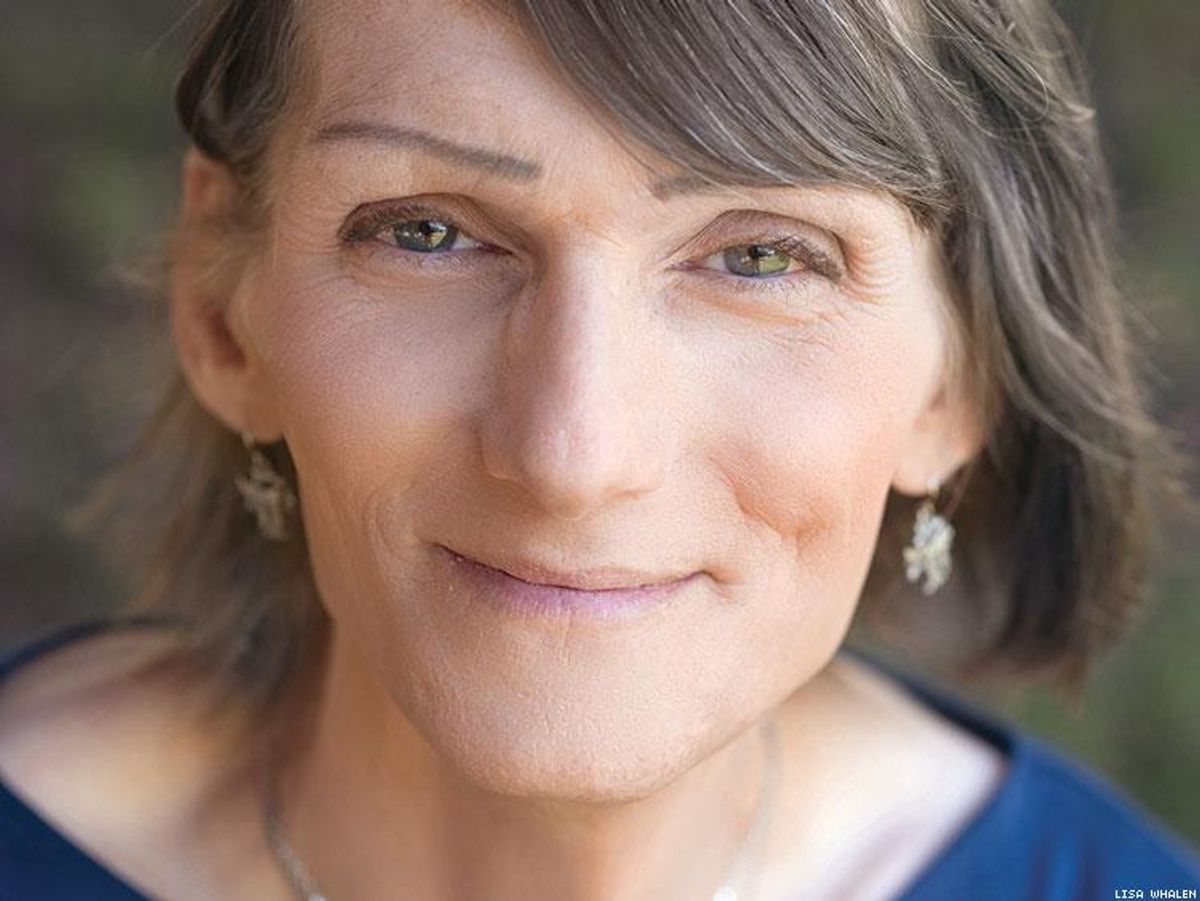Michelle-Lael Norsworthy spent several decades in a men's prison. Even after she came out as trans and began expressing her gender identity, she remained in general population with male inmates. Norsworthy had been convicted of murdering an acquaintance in 1985 and given a life sentence. In prison, she was diagnosed with gender dysphoria and her psychiatrist recommended she receive gender-affirmation surgery. That request was denied. She filed appeals. Denied.
In 2009, Norsworthy was gang-raped by several inmates. The attack was documented in official prison records, but, she says, prison guards did nothing to stop it.
"[They] think that because you want to be a woman, you want that," she says. "Because you wear lipstick or because you're manufacturing these articles of clothing or are altering them in a manner to display your figure -- that that is an invitation. So their philosophy is, This is what you must want. The philosophy of the male environment inside the prison system is one that women are basically objects. That women live in an existence to serve men. So, rape is not really rape. That's where we have to start. We have to start with [changing] that philosophy [so there is] the right to expression without violation."
Norsworthy says the rape left her with hepatitis C, but she did not receive treatment. Prison officials "allowed it to progress to a place where ... I was dying and I didn't even know it," she says. "The department didn't help do shit. From 2009 to the time I was released, they were just letting me wallow in my hep C and die."
Hep C's impact on her liver became one more argument for surgery: Removing her testes would be less damaging on her liver than a lifetime of hormone-blockers. In 2014, Norsworthy filed another lawsuit, arguing that denying her surgery was cruel and unusual punishment. U.S. District Court Judge Jon Tigar agreed, ordering California to provide her transition surgery. It was a groundbreaking decision. Norsworthy was the first person incarcerated in California -- maybe the first in the U.S. -- to win the right to gender-affirmation surgery. But she never received it. Instead, she was suddenly paroled.
"They basically denied me parole in 2013," Norsworthy says. "I was 'a danger to society.' One year later ... they couldn't get me to the [parole] board fast enough. I mean, there's no lifer in history in the Department of Corrections of California that got expedited more than I did."
The same day Norsworthy's parole was finalized, the California Department of Corrections and Rehabilitation filed a motion to toss out Judge Tigar's opinion, arguing that since she'd been paroled, the ruling was moot. Norsworthy's attorneys -- from Transgender Law Center and Morgan, Lewis, and Bockius -- went back to court, arguing the state was trying to make the precedent (not to mention the cost of surgery) go away by releasing her.
That the state was desperate to avoid a precedent-setting ruling seems clear: After all, in August of 2015, it settled with Shiloh Quine, another trans inmate suing for gender-affirmation surgery. California agreed to pay for Quine's surgery, but only if all parties agreed her case could not set a precedent for anyone else. Quine agreed.
In a blow to the state, the Ninth Circuit Court of Appeals ruled against California, writing that the timing of Norsworthy's release implied "there was at least some chance that the defendants influenced the parole process." Norsworthy's case was allowed to set legal precedent for other inmates. (Earlier this year, Quine became the first Californian to receive gender-affirmation surgery while serving time.)
Since getting out of prison two years ago, Norsworthy has received treatment for her hep C. She's now cured, but says she may have permanent damage to her liver. "It's all right," she said two weeks before her own gender surgery. "I'm 53. I don't have that much time left anyway. As long as I die with my vagina."
That doesn't mean Norsworthy has given up. The firebrand has a new goal in sight. She's founded a nonprofit organization and is intent on opening Joan's House Shelter, which will offer women and trans people (especially recent parolees) transitional housing and food. It's another fight ignited by her own experiences. Released into the San Francisco Bay Area with what she calls a "1980s skill set," Norsworthy learned the hard way that the tech boom has displaced the region's trans (and working-class) residents and sent real estate prices skyrocketing. There simply was no housing available for people like her.
With a board of directors in place, legal paperwork filed and the marketing firm Three Girls Media on board, Norsworthy's next hurdle is finding the funding necessary to buy property in one of the country's hottest real estate markets.
"A lot of groups -- yes, they provide services, but they were not providing shelter or housing. There are no trans specific services when it comes to housing and food. So, like I did inside as a self-advocator, I just go, Fuck it. They don't wanna do it? I'll do it.


















































































Viral post saying Republicans 'have two daddies now' has MAGA hot and bothered